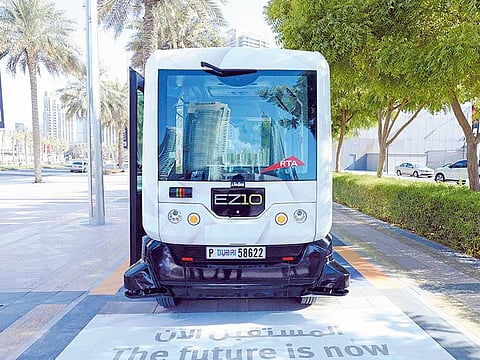Driverless vehicles to be part of public transport in Dubai soon
They could soon provide door-to-door connectivity for commuters along with Dubai Metro and other transport modes

Dubai: Driverless vehicles could be part of the last mile solutions in Dubai in the near future, providing commuters door-to-door connectivity with Dubai Metro and other modes of transport.
The Roads and Transport Authority (RTA) is currently carrying out trials on driverless vehicles, also called autonomous vehicles, in association with Emaar in Downtown Dubai and, according to Mattar Al Tayer, director-general and chairman of the Board at RTA, the trials have been successful so far.
Speaking at a future cities session of Dubai International Project Management Forum (DIPMF) on Tuesday, Al Tayer said that RTA is working with a number of companies to trial autonomous vehicles as a solution for the first and last mile.
“One of the key areas we are working on is to provide first and last mile transport solutions that can easily connect with Dubai Metro and other modes of transport. We are working with different companies trying out various options. We are doing this keeping in mind the requirements of Dubai as well as the kind of weather we have here. We will be doing more trials with companies with different autonomous technologies soon,” said Al Tayer.
He added that the trial of autonomous vehicles at Downtown Dubai has been successful so far.
“We are happy with the trial, it has shown good progress. We have seen that the autonomous vehicle is more successful in covering restricted areas,” he said.
However, he added that driverless cars will be on the road soon.
“To have it on the road is a challenge but soon we are going to see driverless cars on Dubai streets. But for that we need to have the legislation in place first,” he said, hinting that the legislation is likely to be ready soon.
In April this year, His Highness Shaikh Mohammad Bin Rashid Al Maktoum, Vice-President and Prime Minister of the UAE and Ruler of Dubai, announced a target of automating 25 per cent of all transport trips in the city.
He said that RTA’s smart mobility solutions puts Dubai on course to become the smartest city in the world.
As part of the future vision for Dubai, Shaikh Mohammad has set a target of transforming Dubai into the smartest and happiest city in the world by the 2017.
“For a happy city, we need to have three things in place, the city must be connected, liveable and sustainable. Sustainability is now the talk of the town. And as a first step towards achieving it, we need to have sustainable infrastructure, which we are putting in place,” he said.
He explained that RTA has set integrated and sustainable mobility as well as smart transformation as a means to achieve smart mobility. “In terms of smart mobility, we have the longest driverless metro network in the world, we are conducting trials of driverless vehicles with different companies. We are also building the Enterprise command and control centre, EC3, through which all modes of transport will be controlled under one building,” said Al Tayer.
He added that the gold-rated building that will control movement of people, traffic as well as different modes of transport from one place will be ready by March 2017.
EC3 is a unified platform that will bring operations of different modes of transport under one umbrella in Dubai.
In June this year, Shaikh Mohammad approved a model design of the EC3 and the structure is now being built at a cost of Dh335 million.
Another key feature of smart and integrated mobility solution, he said, is the Integrated Mobility Platform (IMP), which will be ready by March 2017.
The IMP is a common booking and payment app for all modes of transports, including Monorail, Dubai Trolley as well as e-hail or mobile app-based taxi services that RTA is currently working on.
Al Tayer said that the IMP is part of efforts to provide connected mobility, giving customers easy access to all mass transit systems through a single window or smart app.
Sustainable development
Detailing RTA’s sustainability record, he said: “We have Euro 4 and Euro 5 standard buses, which emit very little carbon dioxide (CO2). We have built 175km of cycle tracks so far, with plans to have 1,000 kilometres of tracks by 2030.”
Dubai’s biggest smart mobility project, Dubai Metro, has helped reduce millions in tonnes of CO2.
Last year the metro reduced 300,600 tonnes of CO2 emissions, while Dubai Tram reduced 2,800 tonnes of CO2 during the same period.
“One can imagine what would have been the condition of Dubai right now without having such systems,” he said.
Among the sustainable development plans is having 50 per cent of Dubai’s taxi fleet covered by hybrid vehicles by 2020.
He said that RTA’s 173 mobile and smart services have helped in reducing 50 per cent of visits to RTA customer care centres which, in turn, have helped reduce CO2 emissions as well.
Among the plans for the future, all the street lights in Dubai will be converted into LED lights by 2018, while having LED traffic lights is also in the pipeline.
Sign up for the Daily Briefing
Get the latest news and updates straight to your inbox

